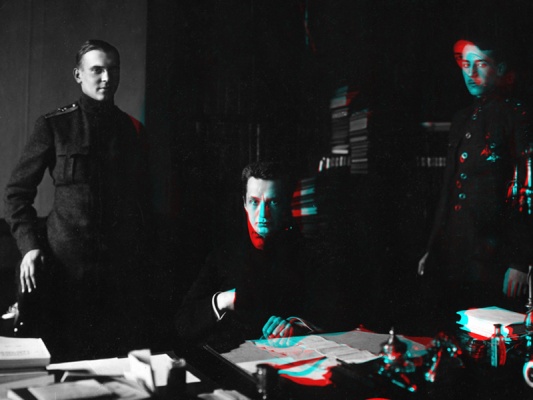"Tereschenko tells me that Korniloff has definitely resigned, that Kerensky will assume the supreme command of the army, with General Alcxcieff as chief of the general staff, and that General Verkhovski, the commander-in-chief of the Moscow district, will become Minister of War.
Korniloff 's venture had from the outset been marked by the almost childish incapacity of its organizers, and ended in a complete fiasco. On arriving at a station some seventeen miles distant from Petrograd his troops were met by Tchernoff and, as they had been kept in ignorance of the object of their expedition, were per- suaded by him to declare for Kerensky. Krimoff, their commander, was brought to Petrograd in a motor, and after an interview >vith Kerensky shot himself. Korniloff was placed under arrest while awaiting his trial for high treason, but succeeded in escaping after the Bolshevik revolution.
Although all my sympathies were with Komiloff, I had always done my best to discourage the idea of a military coup d'etat, as Russia's best hope of salvation lay in a close co-operation between him and Kerensky. Korniloff, who was not a reactionary, honestly believed that Lvoff had been sent by Kerensky to ascertain his views on the political situation ; and he expressed them with his usual frankness, without giving them the form of an ultimatum. The role played by Lvoff in the affair is quite impossible to explain. He misrepresented Kerensky to Korniloff and Korniloff to Kerensky ; but whether he was a knave or a fool I cannot say. He was in any case an arch mischief-maker. It was only after being called on by Kerensky to resign his com- mand that Korniloff decided to act, and in doing so he was prompted solely by patriotic motives. But while he personally would have been ready to work with Kerensky, there were men behind him who had for weeks past been plotting to overthrow the Govern- ment and who were bent on using him as their instru- ment and on forcing his hand.
There w^ere so many persons in the secret of this counter-revolutionary movement that it was a secret no longer. Kerensky knew it, so that when Lvoff brought him what purported — though quite incorrectly — to be an ultimatum from Korniloff, he was already suspicious of and predisposed against him. Though Kerensky undoubtedly regarded him as a dangerous rival, who if he once got control of the army might use it against the Government, I do not believe that he purposely laid a trap for Korniloff in order to get him out of the way. But, like the latter, he had evil counsellors behind him who, for personal or party reasons, encouraged him to remove the commander-in-chief. That he was still hesitating to do so is shown by the fact that he had, in his tele- graphic conversation with Korniloff, promised to come to the Stavka; and it was Nekrassoff who finally per- suaded him to denounce the latter as a traitor. His policy throughout had been weak and vacillating ; fear of the Soviet seemed to paralyse his every action ; he had the chance after the July rising of suppressing the Bolsheviks once and for all — and he refused to use it ; and now, instead of endeavouring to come to an under- standing with him, he dismissed the one strong man capable of restoring discipline in the army. By way, moreover, of defending the revolution, which ever had the first place in his thoughts, he made the further mistake of arming the workmen, and thus played directly into the hands of the Bolsheviks. Writing to the Foreign Office on September 21, I said: "As a well-known foreign statesman remarked to me yester- day, Kerensky has two souls — one as head of the Government and a patriot and the other as a Socialist and Idealist. So long as the former is in the ascendant he issues orders for strong measures and talks of estab- lishing an iron discipline ; but, as soon as he listens to the promptings of the latter, he relapses into inaction and allows his orders to remain a dead letter. I fear, moreover, that, like the Soviet, he has never wished to create a really strong army, and that, as he once re- marked to me, he will never lend a hand to forge a .weapon one day to be used against the revolution."
The “bloodletting” did not come to pass. The divisions sent by KornilovCommander in Chief of the Petrograd command - from 18 March 1917 and the “Petrograders” met outside Luga and in some other places. They lined up tentatively on opposite sides. See more
We may be asked: aren’t we going to fight against KornilovCommander in Chief of the Petrograd command - from 18 March 1917? Of course we must! But this is not the same thing; there is a dividing Line here, which is being stepped over by some Bolsheviks who fall into compromise and allow themselves to be carried away by the course of events. See more
I asked that a telegram should be sent to Kerenski asking him in the interests of the Alliance to come to terms with Kornilov.
I am a total stranger to nationalism, patriotism—all those deficiencies of spiritual vision. Nonetheless, I see that the Russian people are exceptionally, fantastically talented and idiosyncratic. Even fools in Russia are stupid in their own original way, and our lazy folk are positively brilliant. See more


As night fell, we arrived in Helsinki. The most frightening part of it all was walking out onto the square in front of the train station. There must have been a thousand sixteen people, and we had to get past all of them to reach the automobile. See more